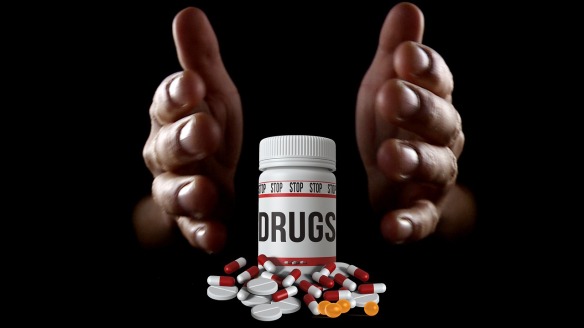By David Joel Miller, MS, Licensed Therapist & Licensed Counselor.
You’re more likely to have a drug withdrawal than you might think.
When people think of drug withdrawal the picture they see is the one of classic heroin withdrawal. Someone coming off heroin or other opiates does some “kicking” both drug wise and legs-wise. They also have diarrhea and “goosebumps.” Because opiates are pain relievers during withdrawals people can experience high levels of pain.
That dramatic type of withdrawal is not the only kind you might have. Each drug you might take can have some effects when the level in your body, principally in your bloodstream, begins to drop.
Drug Withdrawal Defined.
Drug withdrawal is an identifiable illness or syndrome that happens when someone stops taking a drug or reduces the amount they are using significantly. The symptoms begin when the level of a drug in the blood drops. Withdrawal symptoms can vary in severity and each drug has its own pattern of withdrawal symptoms. An alternative name for withdrawal is Abstinence Syndrome.
In the early stages of drug use, withdrawal symptoms may be minimal and go unnoticed. Once the body has adjusted to having that drug present and made adaptations the symptoms become more pronounced. Symptoms may not be entirely physical. For some drugs the primary withdrawal symptoms are psychological.
Withdrawal symptoms make it harder to stop using drugs.
The more severe the withdrawal symptoms the more likely the user is to pick that drug back up to reduce those symptoms. A withdrawal symptom of drugs taken to reduce anxiety, prescribed or self-medicated ones, is an increase in anxiety. People who smoke marijuana to reduce anxiety report that the anxiety gets really bad after they discontinue smoking it. This results in a return to marijuana use.
Getting rid of withdrawal symptoms is a strong motivator to resume drug use again.
The DSM-5 lists withdrawal effects for eight of the eleven classes of substances.
I find it interesting that some drugs such as Inhalants and Hallucinogens have no withdrawal symptoms specified. We also have only one diagnosis and F code for the group of drugs, Sedative, Hypnotic or Anxiolytic Drugs. Withdrawal from these drugs can be different with different drugs. Stimulant Withdrawal is separated and has one code for Cocaine and another for Amphetamines and other stimulants. These DSM-5 codes are a rough sketch. For the full details consult the DSM-5 text. Also, note that there are well-defined withdrawal criteria for Cannabis (Marijuana) and Caffeine.
Alcohol Withdrawal (F10.239 or F10.232)
Caffeine Withdrawal (F15.93)
Cannabis (Marijuana) Withdrawal (F12.288)
Opioid Withdrawal (F11.23)
Sedative, Hypnotic or Anxiolytic Withdrawal (F13.239, F13.232)
Stimulant Withdrawal
Amphetamine or other stimulant (F15.23)
Cocaine Withdrawal (F14.23)
Tobacco Withdrawal (F17.203)
Other (or Unknown) Substance Withdrawal (F19.239)
For more on drugs and recovery see:
Drug Use, Abuse, and Addiction Recovery
Terms and their meaning can differ with the profession using them. The literature from the Rehab or AOD (Alcohol and Other Drug) field may be very different from that in the mental health field. There is still a large gap between recovery programs, AOD professionals and the terms and descriptions used in the DSM.
FYI These “What is” sometimes “What are” posts are my efforts to explain terms commonly used in Mental Health, Clinical Counseling, Substance Use Disorder Counseling, Psychology, Life Coaching, and related disciplines in a plain language way. Many are based on the new DSM-5; some of the older posts were based on the DSM-IV-TR, both published by the APA. For the more technical versions please consult the DSM or other appropriate references.
Staying connected with David Joel Miller
Seven David Joel Miller Books are available now!
My newest book is now available. It was my opportunity to try on a new genre. I’ve been working on this book for several years, but now seem like the right time to publish it.
Story Bureau is a thrilling Dystopian Post-Apocalyptic adventure in the Surviving the Apocalypse series.
Baldwin struggles to survive life in a post-apocalyptic world where the government controls everything.
As society collapses and his family gets plunged into poverty, Baldwin takes a job in the capital city, working for a government agency called the Story Bureau. He discovers the Story Bureau is not a benign news outlet but a sinister government plot to manipulate society.
Bumps on the Road of Life. Whether you struggle with anxiety, depression, low motivation, or addiction, you can recover. Bumps on the Road of Life is the story of how people get off track and how to get your life out of the ditch.
Dark Family Secrets: Doris wants to get her life back, but small-town prejudice could shatter her dreams.
Casino Robbery Arthur Mitchell escapes the trauma of watching his girlfriend die. But the killers know he’s a witness and want him dead.
Planned Accidents The second Arthur Mitchell and Plutus mystery.
Letters from the Dead: The third in the Arthur Mitchell mystery series.
What would you do if you found a letter to a detective describing a crime and you knew the writer and detective were dead, and you could be next?
Sasquatch. Three things about us, you should know. One, we have seen the past. Two, we’re trapped there. Three, I don’t know if we’ll ever get back to our own time.
For these and my upcoming books; please visit my Author Page – David Joel Miller
Want the latest blog posts as they publish? Subscribe to this blog.
For videos, see: Counselorssoapbox YouTube Video Channel


Pingback: Why do drugs affect people differently? | counselorssoapbox
Pingback: What is an Alcohol Use Disorder? | counselorssoapbox